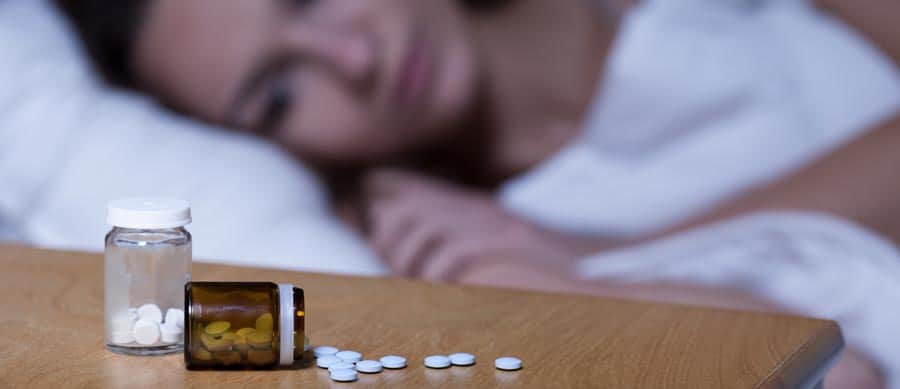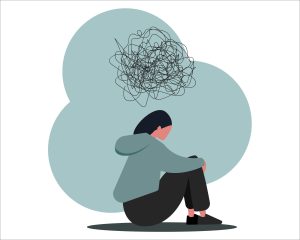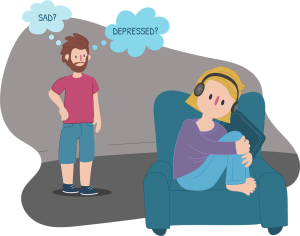Depression is a serious mental health disorder that affects millions of people. While depression can occur in men, it is more common among women. In this blog post, we will discuss the symptoms of depression in women. We will also provide advice on how to get help if you are struggling with this condition.
Contents
- 1 What Is Depression?
- 2 What Is Depression In Women?
- 3 Symptoms of Depression In Women
- 4 Causes of Depression In Women
- 5 Reasons Why Women Are More Prone To Depression?
- 6 Depression In Men v/sWomen
- 7 How are PMS And PMDD Related To Depression?
- 8 Depression In Women During Pregnancy
- 9 Postpartum Depression In Women
- 10 Helping Someone Suffering From Depression
- 11 Conclusion
What Is Depression?
Depression is a mood disorder that causes feelings of sadness and hopelessness. It can lead to a loss of interest in activities you once enjoyed problems with sleeping and eating and difficulty concentrating. Depression is one of the most common mental health disorders.
What Is Depression In Women?
Depression in women has some unique symptoms. Women are more likely to experience sadness, anxiety, and guilt. They may also have physical symptoms like pain, fatigue, and changes in weight or appetite.
Depression in women is often underdiagnosed and undertreated. This may be partly because women are more likely to experience different symptoms than men. Women are also more likely to experience multiple episodes of depression during their lifetime.
Symptoms of Depression In Women
Depression can look different in women than it does in men. Some of the most common symptoms include:
- A persistent feeling of sadness or emptiness
- Loss of interest in activities you once enjoyed
- Problems with sleeping and eating, such as insomnia or overeating
- Difficulty concentrating or making decisions
- Fatigue or decreased energy levels
- Feelings of worthlessness, guilt, or helplessness
- Thoughts of suicide or self-harm
- Pain
- Headaches
- Changes in weight or appetite
Causes of Depression In Women
There is no one answer to this question. Depression can be caused by a variety of factors, including:
- Hormonal changes, such as those that occur during menstruation, pregnancy, and menopause
- Life events, like a death in the family or job loss
- Chronic stress
- Anxiety disorders
- Traumatic experiences, such as sexual abuse or assault
Reasons Why Women Are More Prone To Depression?
Though women are more likely to experience depression than men, it’s important to remember that anyone can develop the disorder. If you think you may be suffering from depression, please seek help from a mental health professional. Treatment for depression can be very effective and can help you live a healthier and happier life.
Is Depression Hereditary?
Depression is not a strictly hereditary disorder, but it may be passed down from one generation to the next. If you have a family history of depression, you are more likely to develop the condition yourself.
Depression In Men v/sWomen
In men depression is different from depression in women in the following ways:
- Depression is often characterized by anger, aggression, and reckless behavior.
- Men are also more likely to abuse drugs or alcohol as a way of coping with their symptoms.
- Depression in women tends to be more internalized, and women are more likely to experience guilt, anxiety, and sadness.
How are PMS And PMDD Related To Depression?
PMS and PMDD are related to depression in the following ways:
- Premenstrual syndrome (PMS) is a group of symptoms that occur in women before their period.
- PMDD (premenstrual dysphoric disorder) is a more severe form of PMS that causes extreme mood swings, depression, and anxiety.
- Both PMS and PMDD can increase the risk of developing depression.
- If you suffer from either of these conditions, it’s important to seek help from your doctor.
- There are treatments available that can help lessen your symptoms.
Depression In Women During Pregnancy
- Depression can occur during pregnancy, but it is not a normal part of the process.
- Pregnancy-related depression can cause many different symptoms, including mood swings, fatigue, and problems with sleeping or eating.
- If you are pregnant and think you may be suffering from depression, please seek help from your doctor.
- Treatment for depression during pregnancy is safe and effective.
Effects of Depression During Pregnancy
- Depression can have a negative impact on both the mother and the fetus.
- Untreated depression can lead to problems with prenatal care, increased risk for miscarriage, and premature birth.
- Mothers who are depressed are also more likely to abuse drugs or alcohol, which can harm the fetus.
- If you are pregnant and think you may be suffering from depression, please seek help from your doctor immediately.
Treatment Options
There are a number of different treatment options available for depression during pregnancy. These include
- Medication
- Therapy
- Lifestyle changes
- It’s important to find the treatment that works best for you and stick with it.
Many women find that a combination of treatments works best.
Postpartum Depression In Women
- Postpartum depression (PPD) is a type of depression that occurs after childbirth.
- PPD can cause a wide range of symptoms, including mood swings, fatigue, and problems with sleeping or eating.
- PPD can also lead to thoughts of suicide or self-harm.
- If you think you may be suffering from PPD, please seek help from your doctor immediately.
- There are treatments available that can help you recover from PPD.
Symptoms of Postpartum Depression
The most common symptoms of postnatal depression are:
- Mood swings
- Fatigue
- Problems with sleeping or eating
- Lack of interest in activities formerly enjoyed
- Feelings of guilt, worthlessness, or inadequacy
- Thoughts of suicide or self-harm
- If you are experiencing any of these symptoms, please seek help from your doctor.
There is treatment available that can help you recover from postnatal depression.
Treatment of Postpartum Depression
There are many treatment options for postpartum depression.
Therapy
There are a number of different therapy options available for depression in women. These include
- cognitive-behavioral therapy: This type of therapy helps you change the way you think and behave.
- psychodynamic therapy: This type of therapy focuses on your past experiences and how they may be affecting your current life.
- supportive psychotherapy: This type of therapy provides emotional support and guidance.
- Exercise: Exercise has been shown to be an effective way to reduce the symptoms of depression. Try to get at least 30 minutes of exercise each day.
- Relaxation techniques: Relaxation techniques such as yoga, meditation, and deep breathing can help reduce stress and anxiety.
- Diet modifications: Make sure you are eating a healthy diet with plenty of fruits and vegetables. Avoid processed foods and sugary drinks.
If you are considering making lifestyle changes as part of your treatment plan, please talk to your doctor about which ones may be best for you.
Medications
There are a number of different medications available for treating depression in women. These include
- Antidepressants: Antidepressants are medications that are used to treat depression.
- St. John’s wort: St. John’s wort is a natural supplement that has been shown to be effective in treating mild to moderate depression.
- Bupropion: Bupropion is a medication that is used to treat depression and nicotine addiction.
- Antianxiety: Benzodiazepines are medications that are used to treat anxiety. They work by slowing down the activity of the brain. If you are considering medication as part of your treatment plan, please talk to your doctor about the possible side effects.
- Mood stabilizer: Lithium is a medication that is used to treat. It works by stabilizing the mood swings that occur in people with bipolar disorder. If you are considering medication as part of your treatment plan, please talk to your doctor about the possible side effects.
Side Effects Of Benzodiazepines
The most common side effects of benzodiazepines include:
- Drowsiness
- Slowed breathing or heart rate
- Confusion
- Memory problems
- These are not all of the possible side effects, so please talk to your doctor if you are taking this medication.
Side Effects Of Lithium
The most common side effects of lithium include:
- Nausea
- Drowsiness
- Weight gain or weight loss
- These are not all of the possible side effects, so please talk to your doctor if you are taking this medication.
Side Effects Of Antidepressants
The most common side effects of antidepressants include:
- Nausea
- Drowsiness
- Weight gain or weight loss
- Sexual dysfunction
- These are not all of the possible side effects, so please talk to your doctor
Furthermore, there are a number of different treatment options available for women suffering from depression. These include medication, therapy, and lifestyle changes. It’s important to find the treatment that works best for you and stick with it
Helping Someone Suffering From Depression
If you know someone who is suffering from depression, there are a number of things you can do to help.
- The most important thing is to be supportive and understanding.
You can also:
- Encourage them to seek treatment
- Offer practical assistance such as food, transportation, or childcare
- Provide emotional support
- Remind them that they are not alone and that there is hope for recovery
- If you are concerned about someone’s mental health, please talk to your doctor. There are treatments available that can help.
Conclusion
Women are more likely to be diagnosed with depression than men. There is also a higher prevalence of postpartum depression in women than there is for fathers, which can lead to negative outcomes on children’s development. If you or someone you know has been affected by this mental disorder, it’s important that they seek help as soon as possible so they don’t suffer the consequences of not getting treatment. We want to ensure your loved ones get the care and attention they deserve during their time of need, so please contact us today if we can be a resource for you.












